News & Articles
Browse all content by date.
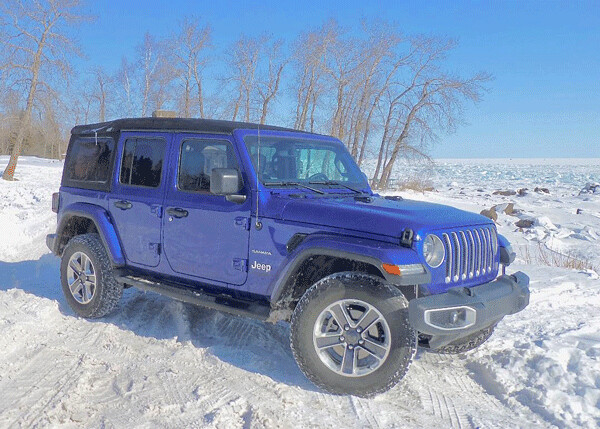
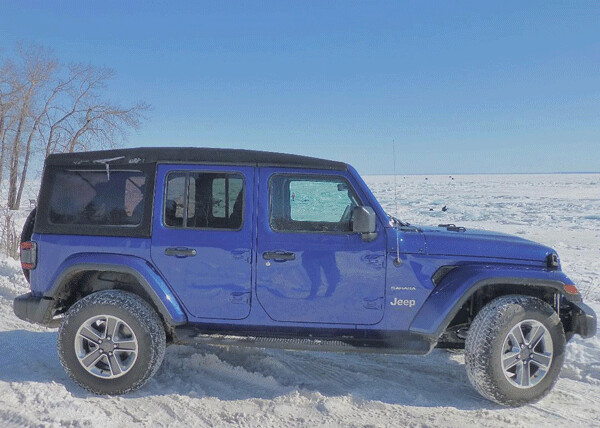
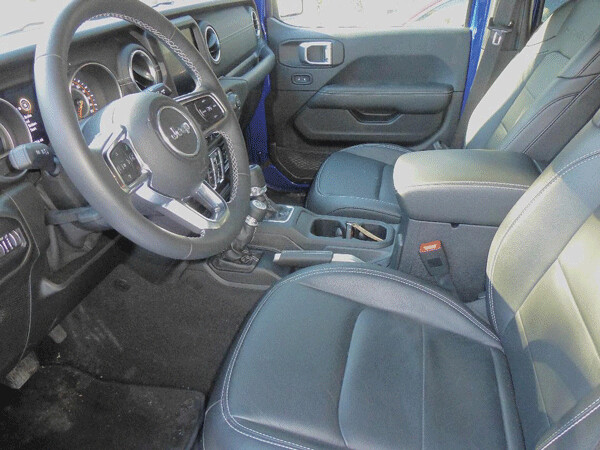
The divide between vehicle buyers in the U.S. has been delineated for years by Jeeps: those who love ’em and those who hate ’em.
The ones who hate Jeeps outnumber the fans, of course, and figure the Jeep outlived its usefulness in the face of the barrage of new and capable competitors. But there is nothing quite like the loyalty of those who love Jeeps, and who willingly put up with the nasty frequency of repair figures and comfort that used to be similar to riding on a pogo-stick, in order to extract the satisfaction of driving a no-compromise off-road conqueror.
The test subject here is the 2018 Jeep Wrangler Unlimited Sahara 4x4, in a stunning Ocean Blue Metallic Clearcoat color, even when it was under a few layers of slush and road-treatment stuff. This was a 4-door, with a fabric top that would be fun in the summertime because it has a sunroof and is removable. I didn’t try it with the wind-chill at 20-below.
The ride is refined to a point of comfort previously unimaginable in a Wrangler, as is every interior appointment and the fit and finish of fabrics and soft-touch surfaces — to say nothing of the high-tech features including the navigation system and screen, and all the connectivity outlets and controls.
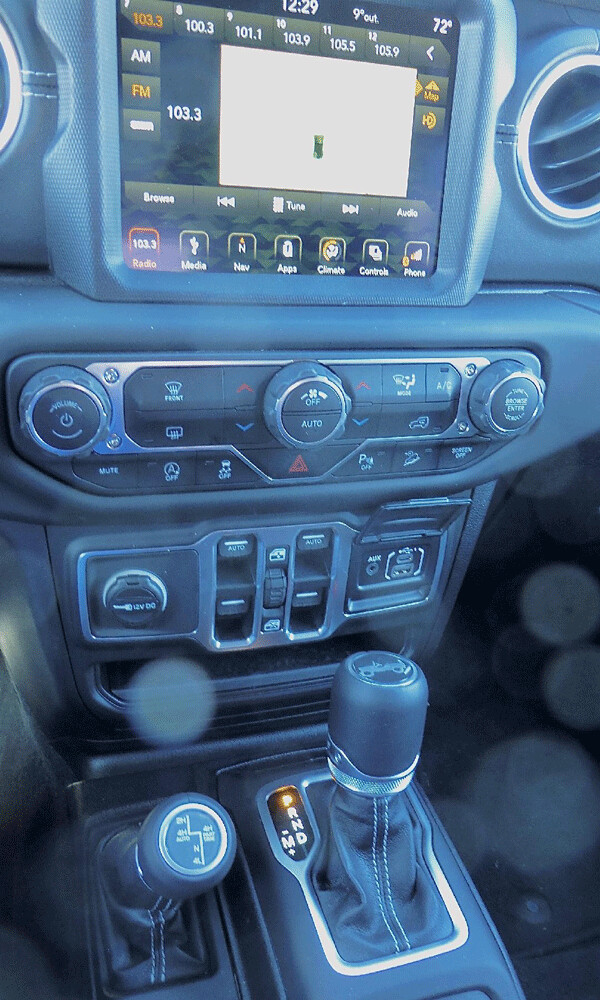
It’s a sleight-of-hand trick. Where most SUVs pretend to be off-road worthy but are best suited as bulky on-roaders, the new Wrangler is the unchallenged off-roader that can now match to smoothest SUV-wannabes in their own domain. The sticker price is hefty, with the test Sahara starting at a base price of $38,295, and the Unlimited Sahara so loaded with features and options that it stickers at $50,050.
Jeep and FCA have learned a lot from their fleet of more domesticated Jeeps such as the Grand Cherokee, Cherokee, Compass and even the Renegade. But instead of excluding the Wrangler from such sophistication, we must now focus on the transformation of the Wrangler, the Jeep that started it all as a rugged off-road vehicle during World War II. Critics accuse Jeep and its new owner, Chrysler and now FCA (Fiat Chrysler Automobiles) of not being aware that WWII ended.
But despite the similarities to the tradition and heritage of Jeeps long-since passed, it’s time to take another look at the Jeep Wrangler. Best to look at a 2019, but the new generation platform with its high-strength steel, plus its new engine and interior features, mostly hit the showrooms for 2018, so we can closely examine the 2018 and see what the latest stature is for the Jeep Wrangler. Prepare to be impressed. Especially if you had some experience with its more primitive predecessors and haven’t seen what the late Sergio Marchione championed in his managerial renovation of the Jeep lineup.
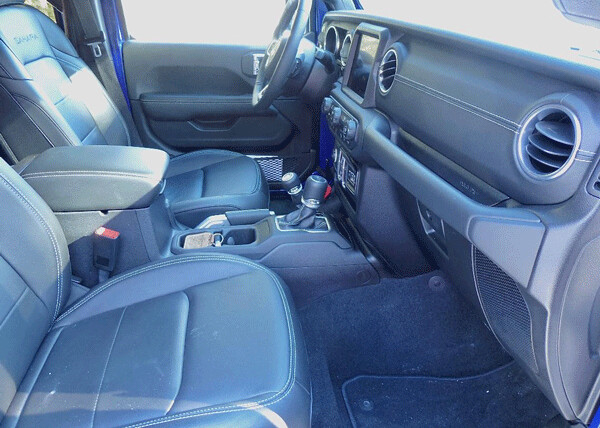
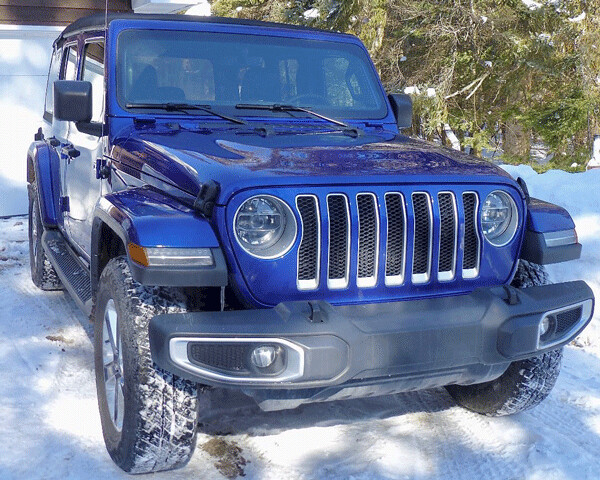
With SUVs taking over the marketplace these days, most SUV buyers are looking for smooth comfort as well as the utility of all-wheel drive, and they’ve lost complete touch with the rugged, outdoorsy challenges of true SUVs.
That’s undoubtedly the biggest surprise in store for consumers, because the new Jeeps have all been sophisticated, but the good ol’ Wrangler improvements are the most startling. So startling that Motor Trend ignored the raft of new crossovers and chose the year-old body-on-frame Jeep Wrangler as its “SUV of the Year” for 2019. That came out two months after the same magazine said in its SUV capsules that the Wrangler was “unchanged” for 2019 after all the changes for 2018 except for adaptive cruise and emergency braking and forward collision warning. Those are far beyond the vehicle’s history.
Sure it still has the braided straps securing the doors from flying open too far, but that’s just a nod to the past. The new Wrangler Unlimited Sahara 4x4 I test drove for a week in subzero cold and foot-deep snow along the North Shore of Lake Superior seemed eager to take on the nasty conditions but also insisted on carrying us in smooth on-road comfort, with supportive bucket seats up front and the 60-40 rear seats that conveniently fold down to allow storage of long items.
There are places, such in the Rocky Mountain High Country or the remote areas of Moab in Utah where you can only get into, or out of, with a Jeep. A precious few Land Rovers might do it too, but if you are lucky enough to take a guided trek into those most-remote areas, the tour guide will be in a Jeep, and you will be astounded at how it can seemingly defy gravity to get to some of those places.
So everyday driving, with occasional ventures into the woods or wilderness, are child’s play for such an over-engineered vehicle that has risen far above the level of expensive boy-toy.
It’s fun to note the upgrades, because designers have worked to fit them in without disrupting the traditional look of the seven-opening grille. The round headlights, for example, now house narrow, rectangular LED headlights that use the roundness as a reflector to illuminate the road ahead. The test Jeep also had LED taillights, foglight, and daytime running lights as part of a thousand-dollar LED package.
Perhaps the greatest upgrade is under the hood, where a sensational 2.0-liter 4-cylinder “eTorque” engine resides in all its turbocharged splendor. Yes, you can still get a potent V6, the 3.6-liter Pentastar, with 285 horsepower and 260 foot-pounds of torque, but this new and impressive direct-injection turbo four has 280 horsepower (almost as much) and 306 foot-pounds of torque (far more). Everytime I gave anyone a ride in the Wrangler, the passenger couldn’t believe it was churning out all that power with a 2.0-liter four.
Underneath, the new generation Wrangler feels totally secure with a strengthened platform and upgraded suspension. Jeeps can now be selected for whatever your intended driving might be. So you’ll want to choose your specific favorite carefully to make sure you get the right 4-wheel-drive system, engine, transmission and suspension, all varying by model. The Sahara with its 2.0 Turbo comes with a new ZF 8-speed automatic transmission, and Selec-Trac all-wheel drive with a shiftable lever for low or high, 2- or 4-wheel drive, replacing the standard Command-Trac part time unit.
It also is tuned for a little more comfort out of its suspension, which doesn’t intrude a bit on its ability or eagerness to go charging off through foot-deep snowfalls or serious off-roading ventures. It also has hill-descent control, and thoroughly modern stuff like electronic stability control, electronic roll mitigation, trailer sway damping, ParkView backup camera, voice commands for the Bluetooth connections, blind-sport and cross-path detection, Apple CarPlay, and, just in case you suspect it’s gotten too fancy, it has skid plates underneath the fuel tank, transmission and transfer case so you can listen to audio stuff while careening over rocks or rugged off-road terrain.
The much more solid feel, the power of the potent new engine, and the comfort and appeal of the vastly upgraded interior might give you a shock every time you stop and climb out, then look back and realize it has retained that old familiar Jeep Wrangler look. This is not a pretender of any fashion; it’s a Jeep Wrangler that still outdoes other off-roaders and now can match any of them on-road or in high-fashion settings.
| Tweet |


